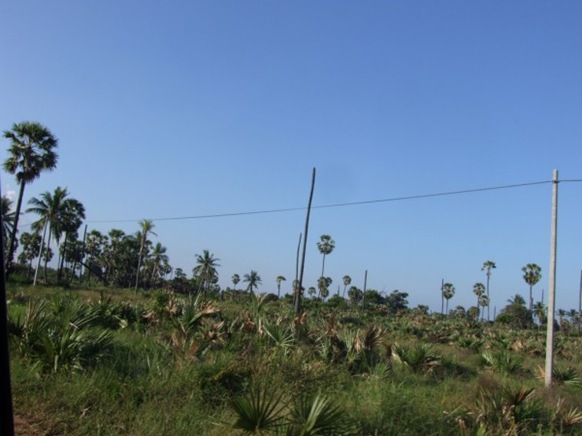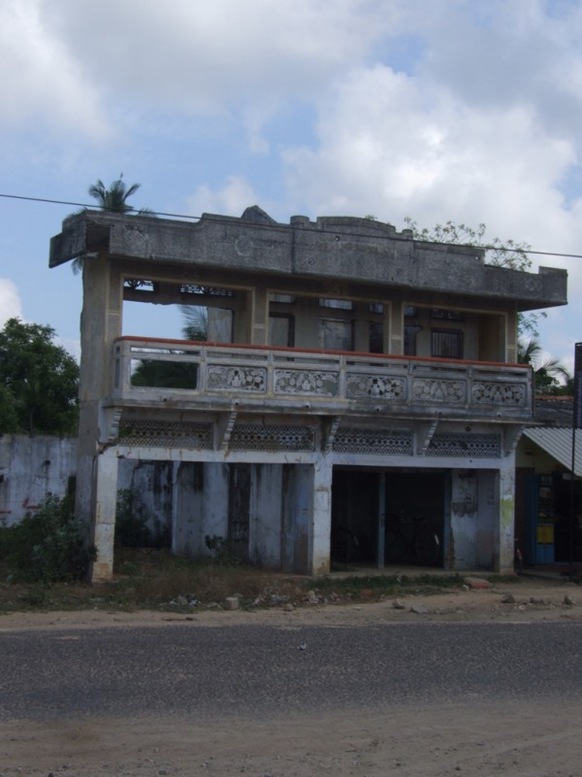(dbsjeyaraj.com) The devolving of Land Powers to the Provincial Councils is an issue like that of devolving Police powers which is causing a political furore in Sri Lanka.
In recent times this important issue has been muddied further by President Rajapaksa’s pronouncements that Land powers will not be given to the Provincial councils.
The Tamil National Alliance(TNA)which is the premier political formation representing the Sri Lankan Tamils continues to emphasise that land powers should be devolved to the Provincial council in terms of the Constitution. This position has also been endorsed to some extent y the Sri Lanka Muslim Congress (SLMC) and Tamil Makkal Viduthalaipp Puligal(TMVP)
The TNA national list Parliamentarian and Lawyer MA Sumanthiran who explained his party’s position on the question of devolving police powers in an incisive opinion piece reproduced on my blog some weeks ago has now written on this prickly topic.As in the case of the article on Police powers this one on lands also sheds much light of an informed nature on an issue that is generating lots of uninformed heat.

Result and Remain: Headless Palmyrah trees in Mugamaail, Jaffna districtNorth of Sri Lanka. The trees suffered as a result of war in the area-picture by Dushiyanthini Kanagasabapathipillai
Incidently Mr.Sumanthiran has appeared as a lawyer in some important cases concerning land issues. Also he himself petitioned courts in his capacity as an owner of land in the North and got a controversial circular about lands registration withdrawn.
Why I mention this is to inform readers that Mr. Sumanthiran has first-hand knowledge and experience about this controversial issue not only as a Parliamentarian but also as lawyer,landowner and litigant.
I am therefore reproducing Mr.Sumanthiran’s viewpoint in full on my blog for the benefit of readers.
So here it is Friends-DBS Jeyaraj
 |
|
M.A. Sumanthiran MP |
Principal Reasons for TNA Position on Devolution of Land Powers
by M.A. Sumanthiran MP
Subsequent to my opinion piece on why the TNA believes police powers should be devolved – published two weeks ago – the response to it from many moderates of the Sinhala community was overwhelming. What that response demonstrated was that moderates from the Sinhala, Tamil and Muslim communities share much in common, and that the path to the resolution of the ethnic conflict need not be as treacherous and tortuous as it presently is.
There is a critical – albeit silent – mass of reasonable, generous and farsighted people across the communities who are capable of joining together to shape a different vision for how this country should be governed. It is therefore necessary to engage in social and political processes that bring these people together, and it is in that spirit that I venture to place the reasons for the TNA’s positions on the devolution of land before you. The democratic leadership of the Tamils can be justifiably accused of failing to place the reasons for their positions before the Sinhala people and win over their support. I think it is important to remedy that default on our part.
To begin however, it is worth noting that the call for the devolution of land powers is not the exclusive prerogative of the Tamil people.
People from all over the country desire a measure of local control over the decisions that affect them, especially over land. In fact, the recent controversy surrounding an amendment to the Town and Country Planning Ordinance has highlighted that the debate on land powers is not a North versus South issue.
The recent attempted amendment of the Town and Country Planning Ordinance would have, if passed, given almost unchecked control over private lands to the Minister of Buddha Sasana and Religious Affairs.
The amendment would have enabled relevant Ministers to gazette “conservation areas”, “protection areas”, “architectural areas” and most controversially “sacred areas”. What is most frightening is the lack of a definition of “sacred areas”, coupled with the vesting of almost exclusive control over such private lands to cabinet Ministers.
The Supreme Court ruled in Special Determination 3/2011 – in which I appeared as Senior Counsel for the Petitioner – that since land was a devolved matter under the 13th Amendment, the views of the Provincial Councils must have been sought before the amendment was placed before Parliament. Thereafter, when the President did in fact refer to the Bill to the Provincial Councils, many provincial councillors in the South expressed grave reservations about the Bill. In fact, the North Central Provincial Council – dominated by UPFA members – voted against the Bill. Other Provincial Councils are in the process of deciding where they stand.
The controversy surrounding the amendment to the Town and Country Planning Ordinance highlights an important issue. It is a reminder of the chilling prospect of unfettered central control over land powers.
The notion that a central cabinet minister could, on a whim, deprive citizens over their right to use and enjoy their own private property is alarming. And yet, that is precisely what the Cabinet intends to pass. The good sense of some Provincial Councillors provides the only bulwark against this brazen land grab.
Yet, while the expropriation of private property in the South is a fairly new phenomenon, the forcible takeover of private property in the North has for some time been taking place with impunity in the North. The military continues to occupy a large number of private dwelling houses in the North, while in the East, entire communities have been forcibly evicted from their areas to make way for settlers from other areas. As I have stated before “it is in the history of the people of the North and East, that the South will see its future.” It is with these lessons in mind that I venture to suggest the principal reasons for the TNA’s position on the devolution of land powers.
First, decisions over land must be made at a unit of governance that is close to the people and by decision makers who understand the specific needs of the people in that area. Land issues by their very nature are region specific, and influenced by hundreds if not thousands of years of history and culture. In the land-starved Jaffna Peninsula for instance, the modes of conveyancing land and the value placed on small properties of land are indeed different to the practices prevailing in other parts of the country.
To expect decision makers situated in Colombo who have little or no understanding of local norms and customs to make decisions relating to land is meaningless. For example, the TNA has highlighted the injustice of the government’s resettlement of persons from areas in Mullaitivu in an area called Kombavil. Notwithstanding our serious reservations about the reasons for the failure of the government to resettle people in their places of origin, even those who ascribe good faith to the government can never justify the resettlement of primarily fishing communities in an area that is 8 kilometres from the sea! This resettlement programme has rendered those resettled in Kombavil jobless and destitute.
Second, decisions over land must be made by those who are directly accountable to the people most affected by such decisions. This is a condition that is essential to any democratic functioning. Provincial Councillors, who directly answer to people within the Province, are more likely than central politicians to be held accountable for the decisions relating to land made within the Province. A Minister of Lands or a Minister for Economic Development from Matara or Hambantota is unlikely to be held to account by voters in the North.
This lack of accountability then induces irresponsible decision making. The recent Land Circular for instance – which was withdrawn after I filed a case in the Court of Appeal challenging it – related only to the Northern Province and caused a great deal of anxiety to people in the North. In fact it purported to give armed personnel a measure of power over disputes relating to land title! The circular was ill-conceived and wholly illegal. It only managed to see the light of day because the Hon. Minister of Lands cannot be held to account by citizens in the North most affected by the Circular.
Third, just as is the case with police powers, the devolution of land powers is a necessary corollary to any meaningful devolution of powers. Control over land use is essential to successfully design and carry out any development activity. For instance, how will it be even possible for Provincial Councils to implement a provincial agricultural policy without having a measure of control over the land to be used for such a policy?

Typical and Turn: An abandoned building in Kaithady- picture by Dushiyanthini Kanagasabapathipillai
In the Northern Province, the sheer number of destroyed houses is staggering, and the reconstruction function will feature front and centre of the agenda of a future Provincial Council for that area.
Yet, how is it even possible to design and implement an ambitious but much needed reconstruction drive if control over land does not rest with the relevant Provincial Council? If devolution must be made meaningful, land powers must be devolved and decision makers must be accessible and accountable to the people most affected by their decisions.
There is one matter than requires urgent clarification and comment. The TNA has for some time been critical of the government’s systematic efforts to alter the demographic composition of the North and East, in a bid to silence the democratic voice of the Tamil people. Our position has always been that the government must not cause racial tension and animosity by favouring one community over the other by sponsoring settlements in the North and East.
Yet, our position has often been misunderstood and distorted. We have been accused of wanting to establish a mono-ethnic Northern Province.
These criticisms miss the point. The TNA emphatically does not oppose any Sri Lankan – whether Sinhala, Muslim, Burgher, Malay or Tamil – from taking up residence in the Northern or Eastern Province. Not only is that their democratic right, it is also desirable in order to ensure a more multi-cultural, tolerant and dynamic North and East.
Having fallen victim to sectarian, narrow-minded policies, we are acutely aware of the importance of tolerance and cohabitation. Just as Colombo and Kandy have benefited greatly from the contributions of people from minority communities, towns like Jaffna and Batticaloa have in the past, and must in the future, be given the opportunity to benefit from the diversity this country has to offer.
But what we do oppose, and will continue to oppose, is the policy of state-sponsored setting up of settlements that are intended to alter the demographics of the region, or to achieve some narrow political gain. These settlements do not make the areas in which such settlements occur more cosmopolitan and multicultural. Instead, they entrench mistrust, fear and the segregation of communities. Imagine for a moment if an entire village from Sabaragamuwa were transported at state expense to Matale and settled in an area which natives of the area were accustomed to using for cultivation.
Consider what response would follow if the newly settled community were provided facilities and finances that were never provided to the natives of Matale. Would not the people of Matale be justifiably angered at a government that treated them as second-class citizens? That is the question I wish to pose.
In conclusion therefore, I sincerely hope that we will be able to commence a national people-based dialogue between the moderates of all communities. It is my belief that we will discover that we have more that unites than divides us. In relation to land, it is important to strip away the emotive and irrational positions that we are often driven to, and consider these questions with responsibility.
The devolution of land powers is not merely necessary for the Northern Province, although the need for such powers there is more acutely felt due to the prevailing circumstances there. It is a necessary condition to restoring a responsive political culture that checks the unaccountable exercise of power. It is for these reasons that the TNA calls for the devolution of sufficient powers over land that will make devolution meaningful.
(For updates you can share with your friends, follow TNN on Facebook and Twitter )
